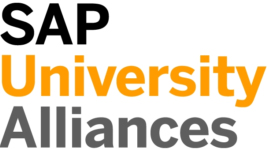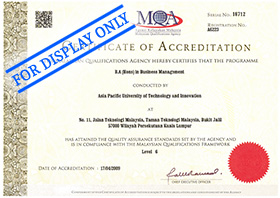You are here
Bachelor of Arts (Honours) in Business Management with a specialism in Business Analytics

|
|
|
APU-DMU DUAL DEGREE PROGRAMME
|
MORE THAN JUST A BUSINESS MANAGEMENT DEGREE
APU's Bachelor of Arts (Honours) in Business Management with a specialism in Business Analytics degree is designed to provide you an edge with the latest technologies that are in line with the Industrial Revolution 4.0. | ||
ADMISSION REQUIREMENTS
| GENERAL REQUIREMENTS | |
| DIRECT ENTRY TO LEVEL 1 OF THE DEGREE: | |
| STPM | • 2 Passes in STPM with a minimum Grade C (GP 2.0) and a Pass in English and Mathematics at SPM Level or its equivalent. |
| A-LEVEL | • 2 Passes (Grade A-D) in A-Level with a Pass in English and Mathematics at SPM/ O-Level/ IGCSE or its equivalent. |
| UEC | • 5 Grade B’s in UEC with a Pass in Mathematics and English. |
| MATRICULATION/ FOUNDATION | • Passed Foundation programme (minimum CGPA of 2.0). |
| ENTRY TO LEVEL 2 OF THE DEGREE: | |
| DIPLOMA | • Successful completion of the APU Diploma or |
* The requirement to pass Mathematics and English subjects at STPM, A-Level and UEC can be waived should the qualifications contain Mathematics and English subjects with equivalent/higher achievement.
| ENGLISH REQUIREMENTS | |
INTERNATIONAL STUDENTS | • IELTS : 5.5 |
PROGRAMME OUTLINE
This programme is specifically designed to provide students with:
- An understanding of the context, nature and implications of analytics and its application to business decisions from stakeholder perspectives.
- A comprehensive understanding and application of business analytics across functional areas including finance, accounting, marketing and human resource management.
- Exposure to the theoretical and practical issues of conducting business in a contemporary and future setting with data at the centre of managerial decision making.
- Developing employment skills such as business analysis, problem solving, evidenced based written and oral communication, using data in decision making, and the ability to conduct research into contemporary business analytical issues.
DEGREE LEVEL 1 |
Students will gain basic understanding of the context within which business operate - Management, Law, Accounting, Economics, Entrepreneurship and Marketing. We will also expose them towards business & communication skills, computing & IT skills, quantitative skills, and independent learning. All Business Management programmes have a common first year so that they will get a solid grounding in core business management theories and practices.
COMMON MODULES | |
|
|
DEGREE LEVEL 2 |
Students will be exposed to more advanced level of curriculum including behavioral science, business ethics & governance, critical thinking in management, and international culture & communications. In-depth understanding in functional management in various areas will be developed as well. They will gain further understanding of core business processes through the industry-leading software supported by SAP and data management. We will further nurture their independent learning to prepare them for the workplace and for further research.
COMMON MODULES | |
|
|
SPECIALISED MODULES | |
|
|
ELECTIVE MODULES (CHOOSE 1) | |
| |
INTERNSHIP (16 WEEKS) |
Students will undertake an Internship/Industrial Training for a minimum period of 16 weeks to prepare them for a smooth transition from the classroom to the working environment.
DEGREE LEVEL 3 |
Students will make use of their previous studies and industrial experience to learn about the business management specialize in business analytics, with aims to groom them as a leader in business analytics.
COMMON MODULES | |
|
|
SPECIALISED MODULES | |
|
|
ELECTIVE MODULES (CHOOSE 2) | |
|
|
MQA COMPULSORY SUBJECTS* |
|
|
(*All students are required to successfully complete these modules as stipulated by the Malaysian Qualification Agency.) Note: The specialism will appear only in the academic transcript. | |
CAREER OPTIONS
|
|
APU - LEADING DIGITAL TRANSFORMATION IN BUSINESS, MANAGEMENT & MARKETING
The Future is Technology - Every Business needs Future-Ready Digital Talents for the Digital Economy
As the 4th Industrial Revolution (IR4.0) takes over the world, we are seeing an upward trend of the amalgamation of Digital Technology with Business. As businesses infuse digital technology within their operations, Digital Transformation elevates customer experience, and transforms business models and operating models within the organisation.
| “Every Business is Becoming a Technology Business” - Manju Bansal - Digitalist Magazine - 2018 |
| "By 2025, the total number of digital skills required by workers to perform their jobs is projected to increase over 6 times – from one billion skills today to 6.8 billion skills." - APAC Digital Skills Index - 2020 |
| “As digital technologies become more prevalent, the digital economy will become the foundation of the modern economy. Accelerating the digital economy is no longer an option but crucial for Malaysia.” - Malaysia Digital Economy Blueprint - 2021 |
| “The digital economy is expected to continue its significant contribution to the country this year, based on an estimated 19.1 per cent contribution to the GDP in 2019 by the Department of Statistics Malaysia, following a forecast of 6.7 per cent economic growth for 2021 by the World Bank. With the launch of MyDIGITAL, the expected contributions from the digital economy towards the GDP is an estimated 22.6 per cent by 2025.” - Malaysia Digital Economy Corporation (MDEC) - 2021 |
For businesses to remain resilient and competitive, they need to innovate, adopt Digital Products, Digital Solutions, have a Digital Growth Strategy, use technology for expansion and growth, as well as equip their workforce with the necessary skill sets to embrace widespread transformation and digital revolution in this Digital Age. The role of “Technology in Business” is vital and technology has challenged and changed every aspect of the way businesses operate at a fast pace. Rapid globalisation has been possible because of technology. Anyone can now do business anywhere in the world with use of high-speed internet, connectivity and presence of well-connected social media. Technology has boosted the development of E-Business, E-Commerce & Digital Marketing and it has brought new dynamics to the globalisation of businesses.
COURSE FEES
Malaysian Students | International Students |
Year 1: RM 32,200 | Year 1: RM 33,600 (USD 7,815) |
* Fees stated here do not include Deposits and other Miscellaneous Fees. Please refer to Fee Guide for details.
MQA ACCREDITATION
(R3/0414/6/0087)(08/30)(A6223) |
| All information is correct at the time of publication, but is subject to change in the interest of continuing improvement. |
Business & Management Degree Programmes |
- Bachelor of Arts (Honours) in Business Management
- Bachelor of Arts (Honours) in Business Management with a specialism in E-Business
- Bachelor of Arts (Honours) in Business Management with a specialism in Digital Leadership
- Bachelor of Arts (Honours) in Human Resource Management
- Bachelor of Arts (Honours) in International Business Management




